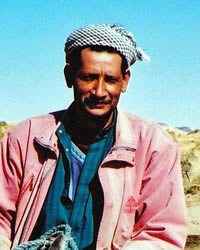Baharia, Wahati in Egypt

Photo Source:
neiljs - Wikimedia
Creative Commons
|
Send Joshua Project a map of this people group.
|
| People Name: | Baharia, Wahati |
| Country: | Egypt |
| 10/40 Window: | Yes |
| Population: | 34,000 |
| World Population: | 34,000 |
| Primary Language: | Arabic, Eastern Egyptian Bedawi |
| Primary Religion: | Islam |
| Christian Adherents: | 0.00 % |
| Evangelicals: | 0.00 % |
| Scripture: | Portions |
| Ministry Resources: | No |
| Jesus Film: | Yes |
| Audio Recordings: | Yes |
| People Cluster: | Arab, Libyan |
| Affinity Bloc: | Arab World |
| Progress Level: |
|
Introduction / History
Long ago the Nile River flowed on a different course, in a great loop across what is now Egypt's western desert. When the river switched to its modern course, a string of oases were left behind. Palm trees rise out of the desert sand to mark where the Nile once flowed. Baharia is one such oasis located in north central Egypt. There are many villages in the oasis, El Bawiti being the administrative center. The people of the oasis are also known as the Wahati people. Most people living in Baharia originally came from Libya and Egypt's northern coast. Only a few outsiders have left their mark on Baharia. After conquering Egypt over 2000 years ago, Alexander the Great built a temple there.
What Are Their Lives Like?
There is substantial tourism to the oasis because of antiquities (tombs, mummies and other artifacts have been discovered there), and because of the beautiful surrounding deserts. Tourism has become an important source of income. The oasis has changed drastically since an asphalt road connecting Baharia to Cairo was finished in the early 1970s. Electricity is now available, and the internet has become available.
What Are Their Beliefs?
The Baharia people are Sunni Muslims who believe that the Supreme God, Allah, spoke through his prophet, Mohammed, and taught mankind how to live a righteous life through the Koran and the Hadith. To live a righteous life, you must utter the Shahada (a statement of faith), pray five times a day facing Mecca, fast from sunup to sundown during the month of Ramadan, give alms to the poor, and make a pilgrimage to Mecca if you have the means. Muslims are prohibited from drinking alcohol, eating pork, gambling, stealing, slandering, and making idols. They gather for corporate prayer on Friday afternoons at a mosque, their place of worship. The two main holidays for Sunni Muslims are Eid al Fitr, the breaking of the monthly fast and Eid al Adha, the celebration of Abraham's willingness to sacrifice his son to Allah. Sunni religious practices are staid and simple. They believe that Allah has pre-determined our fates; they minimize free will. In most of the Muslim world, people depend on the spirit world for their daily needs since they regard Allah as too distant. Allah may determine their eternal salvation, but the spirits determine how well we live in our daily lives. For that reason, they must appease the spirits. They often use charms and amulets to help them with spiritual forces.
What Are Their Needs?
The Baharia people need the chance to make Jesus Christ their lord so they can enjoy the abundant life only he can offer (John 10:10).
Prayer Points
Pray for the Baharia people to give all their allegiance and thanks to the King of kings. Pray for a movement to Jesus to multiply among Baharia families and neighborhoods. Pray for Holy Spirit led workers among the Baharia in Egypt. Pray for the Lord to be the provider for the physical and spiritual needs of the Baharia people in Egypt.